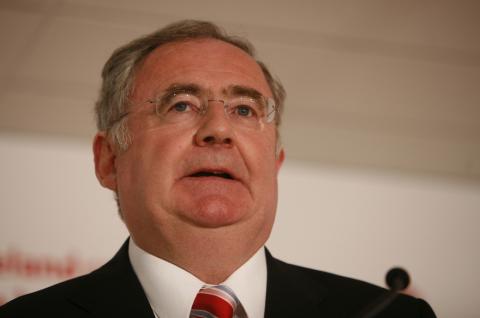RTÉ 'timorous and unprofessional' on IMF story

RTÉ's handling of the Sunday Times story that Ireland could apply to the IMF for a loan in the event of a No vote in the Fiscal Treaty was both timorous and unprofessional. By Vincent Browne.
On Sunday last the Sunday Times carried a story by journalist Mark Paul stating: “the IMF . . . has told the Sunday Times there is ‘no reason’ why Ireland could not ask it for another loan when the current bailout programme ends in 2013.
“Any IMF member country can make an application to us for a loan,” said Bill Murray, its director of external relations. Asked if there was anything to stop Ireland from doing so, he said “no . . . The only countries from which we would not accept an application are non-members or those not in good standing of the previous IMF loans.”
Murray said it did not matter to the agency whether the country had access to the European Stability Mechanism.
From at least 9am on Sunday, RTÉ led the radio news throughout the day with a “story” that the IMF had dismissed the newspaper’s story.
The evening television news bulletins at 6pm and 9pm went as follows: “The IMF has dismissed a newspaper report suggesting Ireland could access alternative funding if the EU fiscal treaty is rejected, as a misinterpretation of remarks by a spokesman.
“Government ministers are insisting Ireland would have no access to any more bailout funds if the people vote No, but those on the No side say a rejection would not close down emergency funding. Tonight the IMF said current fund lending to European countries had been undertaken together with the EU and the ECB.”
This was followed by a clip from The Week in Politics (broadcast later) in which Peadar Tóibín of Sinn Féin referred to the Sunday Times story, followed by a categorical statement by Pat Rabbitte, Minister for Communications, Energy and Natural Resources: “The IMF has made it perfectly plain to us that unilaterally the IMF will not come to the rescue of any member state of the European Union [and would do so] only in partnership with the ESM.”
RTÉ’s Six One News on Sunday had 420,000 viewers, the nine o’clock news 674,000. Probably more than a million people saw one or both of the bulletins and/or heard one or more of the radio bulletins during the day.
So by the end of last Sunday at least a million people here would have had the impression that the Sunday Times story was substantially incorrect and that there could be no funding from the IMF in the event of a No vote. This was potentially a game-changer in the debate.
One would have expected that our lavishly funded national public service broadcaster would have adhered to elementary journalistic standards in the reportage of a story that was potentially of such significance, all the more so in circumstances in which its journalistic practices are under such scrutiny, given its indifference to such standards in the recent past.
One might therefore have expected RTÉ to quote verbatim the statement of the IMF spokeswoman in dismissing the Sunday Times. Had that been the case (as we now know from what RTÉ broadcast the next morning) we would have heard that the IMF spokeswoman, Olga Stankova – while saying the remarks of her colleague, Bill Murray, had been “misinterpreted” – went on to say what IMF practices had been, not what IMF fixed policies were, in relation to the funding of EU states.
In other words, she did not dismiss the Sunday Times story, as had been reported throughout Sunday by RTÉ. And as far as the alleged “misinterpretation” was concerned, she offered no back-up for the claim.
One might also have expected RTÉ not to have broadcast Pat Rabbitte’s comments without challenging him to state on what basis he was claiming that the IMF had made it “perfectly plain” to “us” (presumably the Government) that it would fund EU countries only in conjunction with the ESM; when the IMF stated this; and in what circumstances the IMF stated this. And, if this was done verbally, was he present when it was said? And if done in writing, could we see a copy?
None of this happened, and yet the unchallenged claim was broadcast on an issue of central significance to the Fiscal Treaty debate. This was both timorous and unprofessional. Also unprofessional was the failure to invite the Sunday Times reporter, Mark Paul, to give his account of his interview with the more senior IMF official, Bill Murray. This did not happen until the following morning, by which time the damage was done.
Incidentally, I do not criticise the presenter of the programme on which Pat Rabbitte made this assertion, for I appreciate how easy it is in the course of a “live” programme (or one recorded as “live”) for the presenter to miss a point. But this does not apply to the editors of news programmes, where, clearly, there is time for reflection.
I asked Pat Rabbitte on Monday morning, via his press spokesperson, to answer a series of questions on his IMF assertion. The response: he was “simply relaying the specific advice he received from Minister Noonan”.
Michael Noonan’s office referred me to a speech by Christine Lagarde, head of the IMF, on 23 January: “Any support we provide to euro area countries must be anchored in a clear policy framework for the entire euro area.” {jathumbnailoff}
Image top: The Labour Party.
